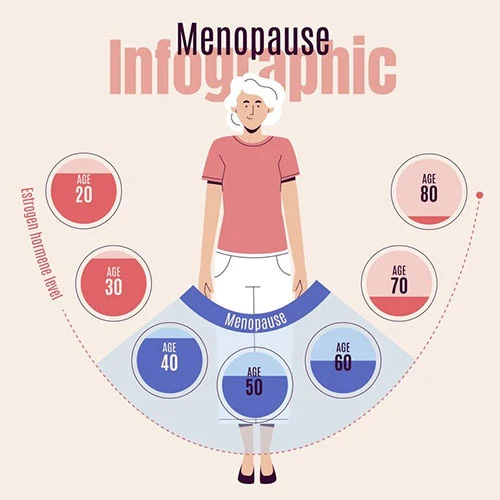
Understanding menopause: What every woman should know
Are you prepared for the changes that come with menopause? Knowing what to expect can help every woman manage this natural process with ease.
Table of Contents
ToggleIntroduction
Menopause is a natural process of growth in women that is bound to happen. It occurs as a part of the aging process in older women, and the body undergoes many essential hormonal changes. It often gets overwhelming for women to manage the menopause symptoms. But with proper knowledge, you can make the most of your menopause journey.
So, in this blog, let’s explore all you need about menopause and learn ways to manage symptoms and care for ourselves.
What is menopause?
Menopause is a natural biological process that marks the end of a woman’s reproductive years, signaling that pregnancy is no longer possible. This transition occurs due to a decline in the production of the hormones estrogen and progesterone by the ovaries.
Menopause typically occurs in women in their mid-40s and progresses through three stages: perimenopause, menopause, and postmenopause. It is a significant phase both physically and mentally.
While menopause is a normal part of aging, women should consult healthcare professionals regularly. This is because menopause can increase the risk of developing various health conditions, such as osteoporosis, requiring careful monitoring and management.
What are the phases of menopause?
There are mainly three phases of menopause. Perimenopause, menopause, and postmenopause. These phases make a journey for a woman as she ends her reproductive years. Let us thoroughly understand these phases:
- Perimenopause: This is the phase when the body starts to prepare for menopause and makes changes. During this time, women can go through hot flashes, mood swings, and irregular periods.
- Menopause: This is the time when a woman passes consecutive 12 months without getting her periods, which will be the end of her productive years.
- Postmenopause: This is the time after the 12 months of not having a period. This is a crucial time as the body adjusts to the lower hormonal levels. Symptoms like vaginal dryness and low sex drive may happen.
Common symptoms of menopause.
Physical symptoms
- Night sweats: excessive sweating during sleeping.
- Vaginal dryness: pain and itching in the vaginal area during sex, vaginal discharge, or urinal discharge.
- Urinary incontinence: a sudden urge to pee or frequent urination.
- Skin changes: dry skin, oiliness or rashes, and acne.
- Weight gain: Gaining more weight or fat building up around the abdomen.
- Change in body shape: losing breast fat and tenderness in breasts.
- Joint and muscle discomfort: excessive joint and muscle pain.
- Changes in hair: hair loss and change in hair color.
Mental symptoms
- Hot flashes: a sudden feeling of heat on the face, neck, or body.
- Headache and migraine: unusual headaches or migraines worse than usual.
Emotional Symptoms
- Mood changes: constant sad mood, irritation, depression, and mood swings.
- Forgetfulness: forgetting things, losing focus, or finding it hard to concentrate.
- Sleep disturbances: finding it hard to sleep at night leading to fatigue or irritability during the day.
Now you know the symptoms of menopause, but do you know how to manage these symptoms to make it easy to cope with them? Let’s get to know it!

How to manage menopause symptoms
There are many easy and useful ways to manage menopause symptoms, like:
- Lifestyle changes: A healthy lifestyle significantly improves the menopause journey, as you may feel fewer symptoms if your body and mind are healthy.
- Maintain a healthy diet.
- Exercise regularly
- Stay hydrated
- Initiate hormone therapy and mindfulness: There are several hormonal therapies and mindfulness options you can try to improve the symptoms.
- Estrogen therapy
- Progesterone therapy
- Yoga and mindfulness
- Counseling and group therapy
- Medications and supplements: Many medications also help in easing symptoms such as:
- Low-dose birth control pills
- Antidepressants
- Vitamin E capsules
Regular health check-ups: It is important to get your checkups done regularly and get proper consultation for symptoms.
However, proper consultation with an expert gynaecologist should be done before medications. We do not advise you to consume any kind of medication without a prescription from your doctor.
Treatments and remedies for post-menopause care
Post-menopause effects can be challenging. But there are many treatments and remedies available for post-menopause care:
- Joint and muscle pain: There are many treatments available for joint and muscle pain, like:
- Cold therapy
- Hot therapy
- Use of massage oils
- Diet-rich in omega-3 and fatty acids
- Mood swings: For emotional impacts like depression and mood swings, there are many treatments like:
- Balanced diet
- Taking a walk
- Antidepressants
- Vaginal dryness treatment: Many times itching and irritations happen in the intimate area, which is known as vaginal dryness. For curing those, there are many vaginal dryness treatments:
- Vaginal moisturizers
- Vaginal lubricants
- Vaginal estrogen creams
- Oral tablets
It is best for you to use any medications without proper consultations. Always prescribe to your doctor before using any kind of medication, and take the proper dose as advised by the doctor.
Natural remedies to ease menopause
You can always use natural remedies for menopause. Many natural ways never impact negatively.
- Drink ginseng tea
- Use Chinese herbs like dong quai in water.
- Eat foods rich in calcium and vitamins D, E, and A.
- Use water-based lubricants for vaginal dryness.
At Hale Clinics, we offer the best gynae service. Book a consultation now to keep your health in check!
Conclusion
Every woman must understand menopause since it is a major life transformation that impacts mental, emotional, and physical health. To have a smooth and healthy transition and keep themselves safe from potential health risks, women should improve their lifestyle, take proper meals, and reduce unhealthy eating. With proper care and knowledge, they can handle this stage with confidence and make wise decisions regarding their health.
FAQs
Q1: What does every woman need to know about menopause?
Ans: Hot flashes and increasing heart rate are symptoms of menopause.
Q2: What are the pillars of coping with menopause?
Ans: Healthy lifestyle, nutritional diet, regular checkups, and proper sleep.
Q3: What should you not do during menopause?
Ans: do not eat highly processed foods, avoid weight gain, do not consume alcohol, and do not ignore any symptoms.
Q4: What are the 2 hormones lost in menopause?
Ans: estrogen and progesterone.
Q5: Which exercises increase estrogen levels?
Ans: Running, cycling, and swimming.
